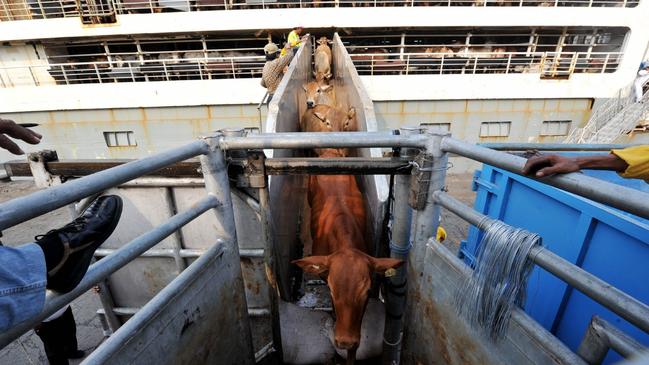Indonesia slams door on Australian cattle after claims on lumpy skin disease out of WA
West Australian officials have dashed to Jakarta to try to salvage the state’s live cattle trade after Indonesia said it had detected eight new cases of lumpy skin disease exported from Australia.

West Australian officials have dashed to Jakarta to try to salvage the state’s live cattle trade after Indonesia slapped crippling new conditions on the industry over what it said was the detection of eight new cases of lumpy skin disease in three new export yards across northern Australia.
Three more live cattle export yards were identified by Indonesian agriculture officials last week as being the source of new cases in cattle already arrived in Indonesia, WA authorities confirmed in Jakarta on the sidelines of a weekend ASEAN business and investment summit.
A Wyndham export yard was one of four Australian facilities suspended by Indonesia, and then Malaysia, last month after authorities there claimed to have detected several cases in Australian cattle shipments on arrival in Jakarta. That left Broome as the state’s last port allowed to export livestock with no conditions attached.
But the latest cases, which The West Australian newspaper reported on Sunday were detected in Broome and two other ports in northern Australia, mean all cattle shipped from those sites must now first undergo nose and mouth swabs, adding millions of dollars in costs that producers cannot afford.
Premier Roger Cook, who is leading a delegation of more than 100 businesses to Jakarta this week, stressed the value of the relationship with Indonesia and the importance of cattle exports.
“We will continue to work closely with the Indonesian authorities to clarify the issues in relation to those rulings. I’m advised that we have no lumpy skin disease incidents or presence of it in Australia and so it is important that we do further testing and have discussion with Indonesian authorities,” he said on Sunday.
West Australian Minister of Agriculture and Food, Forestry, and Small Business Jackie Jarvis said she did not know which depots had been identified in the latest detection round but “I have been advised that three more premises have been closed”.
Lumpy skin disease is a highly infectious viral disease, transmitted by insect bite, that causes blisters and reduces milk production in affected cattle and buffalo but poses no risk to humans.
The virus was first detected in Indonesia early last year and has spread rapidly across Sumatra, Kalimantan and parts of Java.
Indonesia is Australia’s largest market for live cattle, with more than 300,000 head exported there annually and the ongoing issue has the potential to decimate the $1bn-a-year industry.
While Indonesia has made no announcement about the new detections, Australian federal and state officials said they were working around the clock to work through the issue.
Ms Jarvis said Australia was confident it was free of the disease and a team from the federal agriculture department was on its way to Indonesia.
“We don’t expect this to be protracted, we have a good working relationship with Indonesia and our expectation is to sort this out sooner rather than later,” she said. “In recent weeks more than 1000 cattle have been tested across seven areas of more than 2.8 thousand kilometres of landmass, across northern Australia, a dossier of those test results has gone to Indonesia.”



To join the conversation, please log in. Don't have an account? Register
Join the conversation, you are commenting as Logout